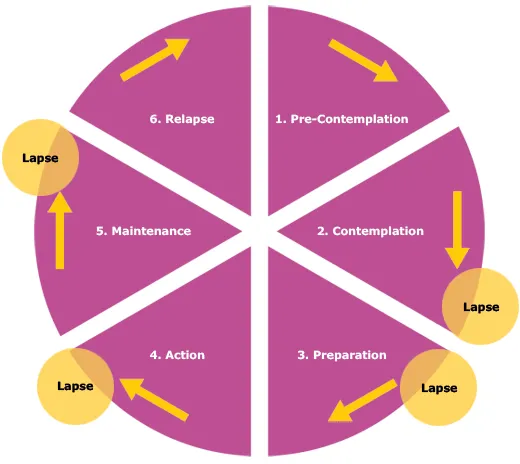
Did you make a New Year’s Resolution?
The New York Times Sunday Review had a lovely article this past weekend about how the first step to meeting your New Year’s resolution is to make a New Year’s resolution. If you have defined goals, you’re more likely to meet them. Wherever you are in your lifestyle, whether you’re completely new to organic living or you’re buying organic and thinking about adding probiotics to your health regimen, taking the next step to change how you’re living can seem an intimidating or even impossible task.
It’s supposed to feel that way. In fact, according to the “Stages of Change” model, developed in the 1970s by researchers James Prochaska and Carlo DiClemente, just recognizing that you want to make a change is progress. The cycle goes as follows:
- Precontemplation is also known as “denial” or “ignorance of the problem.” Often, people in the precontemplation stage simply do not have enough information to understand why they should change. If you have a sore throat and taking Tylenol seems to fix it, why bother looking into Probiotics and zinc lozenges?
- Contemplation is marked with ambivalence and conflicted emotions. Perhaps you’ve browsed our site and our ideas make a lot of sense to you, but you’re not sure if you have the capacity to change your lifestyle or that it will be “worth it.” If you’re having difficulty, writing a pros and cons list of why you should change can help, as can identifying what’s stopping you from changing now.
- Preparation is exactly what it sounds like-making a game plan for how you’re going to get through this. What will motivate you as you look to change? You might try joining our community, or signing up for the newsletter. This is also when you should identify your clear goals, whether they be “buy organic” or “get rid of chemical cleaners.”
- Action is when you go for it and follow through on your preparation game plan. It’s important to use those motivational tools you identified, and connect with others who support your choices.
- Maintenance consists of total integration, the change you sought is now a part of your every day life. You don’t even go in the middle of the grocery store any more-heck, you’re at the farmer’s market or joined a meat CSA. In this stage, you’ll also need to avoid temptation, or you may end up in-
- Relapse. If you do lapse, that’s normal and considered part of the process. The cliche’s are true-change is hard, old habits die hard. But that doesn’t mean you can’t change, and relapse should not be viewed as a failure. You may just fall back to the action stage, or all the way back to precontemplation. Wherever you end up, it’s important to remind yourself why you wanted to change in the first place. You’ll get there, and we’re here to help.
The healthy lifestyle we advocate is all-encompassing, and I know that can seem intimidating. But once you understand how we treat a sore throat can have just as much impact as whether we buy organic, it’s impossible to just recommend some parts of what we do here. My goal is for you to be able to make informed, base decisions that benefit your health and in turn, the environment around you. If you as an individual are sustainable, your environment will follow.
Earlier I mentioned our newsletter, which you might find helps to remind you to stay on track. Or you might find visiting my blog and connecting with others on the site motivates you. If you have any tools you wish the site had, send us an email or comment on this post! We’re here to make your healthy choices as easy as possible. And help you keep that New Year’s resolution-which is hopefully about making healthy choices for you and those around you.
Image by localenterprise.wordpress.com.

